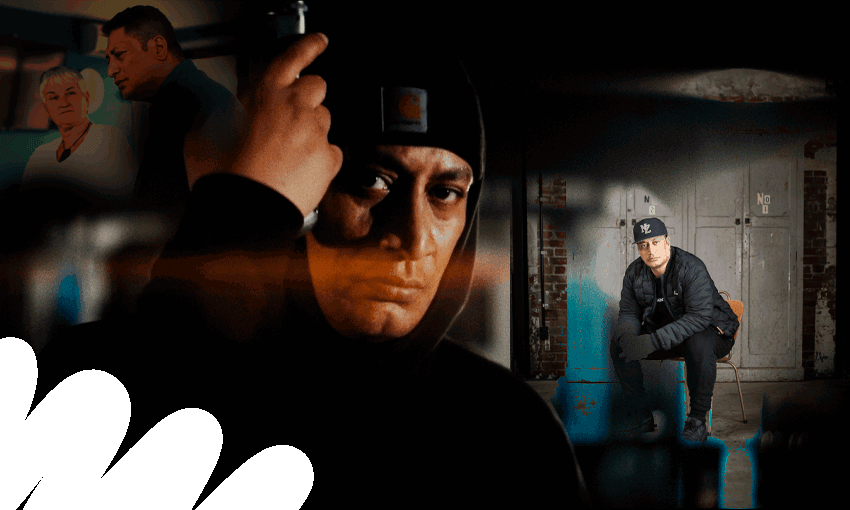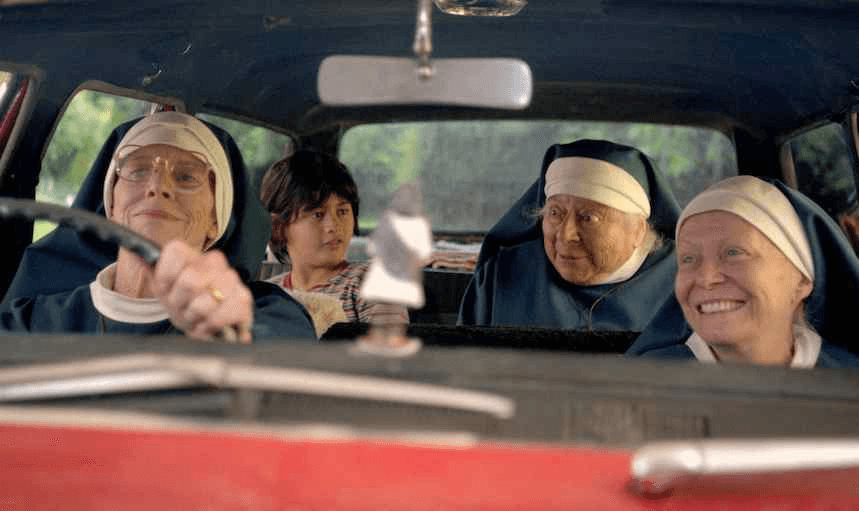Producers of Scribe’s bruising TVNZ series didn’t know how it was going to end.
Malo Luafutu is standing outside a bland weatherboard house in the east Christchurch suburb of Aranui. The famed Aotearoa rapper, more commonly known by the name Scribe, shuffles nervously on his feet while taking deep puffs on his vape. The dark sunglasses covering his eyes are, one suspects, to mask the pain.
Clearly, the house behind him – the childhood home where he grew up – is making him anxious. So it proves. “This,” Luafutu says, gesturing at the building without looking at it, “was a very sad house to live in.”
A small yellow car pulls up, and an elderly woman steps out. It’s Judy, Luafutu’s former neighbour, one who used to comfort the youngster after the constant beatings dished out by his father. From the age of two, Luafutu would run next door and climb into bed with her to escape the violence.
“Everyone around here knew about the hidings that we got,” Luafutu tells the camera.
When Judy arrives, Luafutu’s attitude shifts. His voice sounds light and free. “Oh my goodness!” he exclaims, sounding less like the award-winning rapper known for topping the charts with the gruff chant “How many dudes you know roll like this?” and more like someone who’s just discovered a long lost friend.
He hugs Judy, introduces her and says: “I really love this lady here.”
That scene, both a punch in the guts and a squeeze of the heart, comes early in TVNZ’s brutal new documentary Scribe: Return of the Crusader. Shot over the past year, it covers Luafutu’s troubled childhood before he rolled up the charts, the dark times he experienced after finding musical fame, including 15 years spent addicted to meth.
It also covers his current life, newly sober, reunited with his four children and the rest of his family, with a comeback album in the works.
That scene with Judy? None of it was planned. “Literally, she just drove by,” says Chris Graham, the documentary’s director who was behind the cameras that day.
Graham has directed some of Scribe’s biggest music videos, including the No. 1 hits ‘Stand Up’ and ‘Not Many (The Remix!)‘. After 10 years with no contact, making this documentary has seen his relationship with the rapper come full circle. Many moments, like Luafutu’s reunion with Judy, floored him. “We just went, ‘Oh my god’ … It’s a gorgeous moment.”
Graham’s documentary has plenty of those, from rare home footage of Scribe’s early recording sessions with Peter Wadams, aka P-Money, to being mobbed by fans like he’s a member of the Beatles, and playing to huge, rabid crowds, both here and overseas. There are tearful interviews with Scribe’s family members, including his children, ex-wife, and his cousin, Karoline Fuarose Park-Tamati, the artist known as Ladi6. At Moana House, a rehab centre in Dunedin, the place that helped Luafutu get clean, he hugs the staff who helped him deal with his demons.
It also includes recent footage of Scribe in the studio, recording what appears to be an impressive comeback album, snippets of which appear frequently throughout the series.
But it’s full of dark moments too. Much of Graham’s documentary deals with the after-effects of trauma. The abuse Luafutu and his brothers suffered at the hands of his father, John, is laid bare. A childhood spent battling racial abuse in the streets of Christchurch, including the death of a close friend at the hands of white supremacists, and a confrontation involving a sawn-off shotgun, is covered. Luafutu’s also upfront about his drug abuse, and recent troubles with the law that led to jail time.
Graham admits his series could have been even darker. He, and the film’s production company, The Downlow Concept, had one big problem filming a documentary about Scribe: they didn’t know how it was going to end.
“There’s a gambling element … in terms of where it could go,” Graham admits. “Malo talked openly [about the fact that] there were no guarantees and as a recovering addict he might relapse at any time. We knew that potentially it could be an incomplete or unfinished story arc and that the end of the story might well be, ‘Scribe’s vanished again,’ or, ‘He’s relapsed.’”
Graham’s attitude? “Let go. Let it be what it is.”
That meant it was a different kind of project for Graham, known for his celebratory music videos and work behind the camera on dramas like The Panthers. “I really did think this was going to be a portrait of Scribe, one of the best rappers out of New Zealand, the history he’s been through and the fight with his addiction,” he says.
Instead, it became something else: “A story of triumph, rising out of adversity and a story of inspiration and just getting past trauma and following your dreams.”
Scribe’s documentary comes at a time when local hip hop fans have the opportunity to reflect. On RNZ, two seasons of NZ Hip Hop Stand Up have aired, providing mini-documentaries – many made by Graham – that dive into specific homegrown hip hop hits, songs like OMC’s ‘How Bizarre,’ Dam Native’s ‘Behold My Kool Style’ and Sisters Underground’s ‘In the Neighbourhood’.
Over on Spotify, Phil Bell, aka DJ Sir-Vere, has a huge undertaking with Aotearoa Hip Hop: The Music, The People, The History, a deep dive into how hip hop started around the country. It’s taken three years and more than 100 interviews by him and the music journalist Martyn Pepperell to finish it. Bell’s trying to tell the full, complete history, with his first six episodes only spanning the period through to 1996 — well before Scribe burst onto the scene with his debut single, ‘Scribe 2001’, in 2002.
While the local hip hop scene is still thriving, Graham believes the mid-2000s were a “golden age” of Aotearoa hip hop. “When we were all in it, it was just the most magical, synchronous time,” he says. “It was supportive and competitive at the same time.”
He believes it’s worth paying tribute to it. “It might just be us kind of having middle-age retrospect on how special that time was and we want to re-celebrate it.”
Luafutu’s got his own milestones to celebrate. He wasn’t made available for an interview with The Spinoff, but Graham says he’s with his family in Christchurch and is doing well. His documentary makes it clear it hasn’t always been that way, even recently. “I’m pretty sure he’s hit the year mark now, which indicates even when we were agreeing to do the documentary, he was relapsing,” says Graham.
That meant there was another reason for making the documentary other than recapping history. “He knew [it] would keep him accountable, both for his sobriety, and for the album, and to tell his story,” says Graham. “He’s had some bumpy times in the past year but he’s in a really good space.”
Scribe: Return of the Crusader is available to watch on TVNZ on Demand here.



